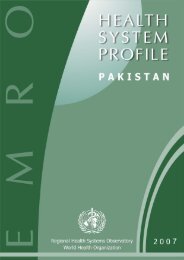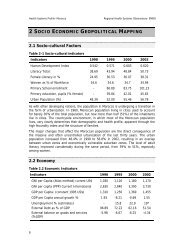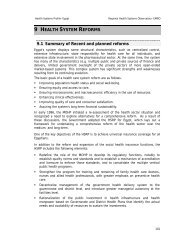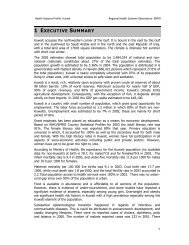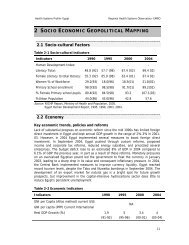The role of contractual arrangements in improving health sector ...
The role of contractual arrangements in improving health sector ...
The role of contractual arrangements in improving health sector ...
Create successful ePaper yourself
Turn your PDF publications into a flip-book with our unique Google optimized e-Paper software.
Islamic Republic <strong>of</strong> Iran<br />
In <strong>health</strong> <strong>sector</strong> reform policies, the impact <strong>of</strong> contract<strong>in</strong>g is thought to be dependent on<br />
how it is implemented. Done well, it can improve technical efficiency (by promot<strong>in</strong>g cost<br />
control), allocative efficiency (by redirect<strong>in</strong>g resources), and cl<strong>in</strong>ical and service quality (if<br />
the contract <strong>in</strong>cludes measurable performance goals). As well, contract<strong>in</strong>g to improve access<br />
by requir<strong>in</strong>g a volume <strong>of</strong> free care on thereby improve the equity <strong>of</strong> system performance<br />
(Robert JM et al, 2004).<br />
Contract implementation and management, however, particularly <strong>in</strong> a complex <strong>health</strong><br />
care environment <strong>in</strong> a develop<strong>in</strong>g country such as Islamic Republic <strong>of</strong> Iran, require<br />
managerial capacity and skills, adequate human and f<strong>in</strong>ancial resources, <strong>in</strong>ter<strong>sector</strong>al and<br />
<strong>in</strong>tra<strong>sector</strong>al coord<strong>in</strong>ation and collaboration, and broad cultural, legal and political<br />
agreements.<br />
<strong>The</strong> Iranian <strong>health</strong> care system faces a number <strong>of</strong> <strong>in</strong>stitutional, f<strong>in</strong>ancial and<br />
adm<strong>in</strong>istrative gaps: gaps between the public and private <strong>sector</strong>s, levels <strong>of</strong> <strong>health</strong> care delivery<br />
(disrupted referral system), payments and remuneration, physician and staff earn<strong>in</strong>gs <strong>in</strong><br />
hospitals (between different groups <strong>of</strong> physicians and between physicians and non-physician<br />
staff), and rules and laws as practice guidel<strong>in</strong>es <strong>in</strong> provision and delivery <strong>of</strong> <strong>health</strong> care<br />
services.<br />
Neither <strong>health</strong> care managers nor their counterparts <strong>in</strong> the private <strong>sector</strong> have been<br />
tra<strong>in</strong>ed and acquired necessary skills for quality contract<strong>in</strong>g Meshed Medical Services<br />
University. <strong>The</strong> private <strong>sector</strong> is not yet very well organized and on occasion demonstrates<br />
opportunistic behaviour. For example, accord<strong>in</strong>g to some <strong>of</strong> <strong>in</strong>terviewees, the private <strong>sector</strong><br />
still <strong>in</strong>terested <strong>in</strong> hav<strong>in</strong>g a middle man’s <strong>role</strong> <strong>in</strong>stead <strong>of</strong> actively participat<strong>in</strong>g <strong>in</strong> production<br />
and productive processes Teheran Medical Services University.<br />
Lower payment, together with oversecurity <strong>of</strong> employees’ positions <strong>in</strong> public <strong>sector</strong><br />
(and lack <strong>of</strong> economic th<strong>in</strong>k<strong>in</strong>g among managers <strong>in</strong> different organizational level<br />
(Momensaraie and Pourreza, 2002), are <strong>in</strong>dicated as the ma<strong>in</strong> reasons for <strong>in</strong>efficiency <strong>in</strong><br />
public <strong>sector</strong> performance.<br />
It is a fact that the nations least equipped to make their public <strong>sector</strong> function effectively<br />
are <strong>of</strong>ten those least able to discipl<strong>in</strong>e private markets to achieve public ends (Robert, M. et.<br />
al). However, even <strong>in</strong> an environment with these better characteristics, on some occasions<br />
contract<strong>in</strong>g out produces more results. For example, out sourc<strong>in</strong>g <strong>of</strong> a laboratory <strong>in</strong> one <strong>of</strong><br />
Teheran’s hospitals led to more tests and greater <strong>in</strong>come (TUMS).<br />
CONCLUSION AND RECOMMENDATIONS<br />
Conclusions<br />
Contract<strong>in</strong>g out <strong>of</strong> <strong>health</strong> care services <strong>in</strong> the Islamic Republic <strong>of</strong> Iran was <strong>in</strong>itiated<br />
under the Third Socioeconomic Development Plan <strong>in</strong>troduced <strong>in</strong> 1999. In fact it can be<br />
considered a privatization policy emphasized <strong>in</strong> the plan and its legislation (Article 192).<br />
98







